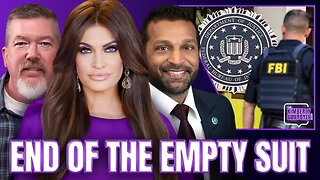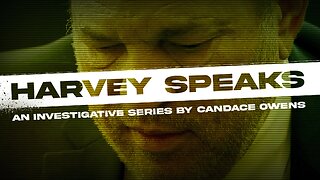Premium Only Content

Episode 1375: Are we lacking Clarity today?
You shall not bear false witness against your neighbor (Exodus 20:16).
Lying is seen as a violation of truthfulness and honesty, which are valued virtues in the Catholic moral tradition.
Today they don’t use the word “lying” but instead “I misremembered”. The lack of clarity in contemporary culture can be attributed to several interconnected factors. It's important to note that culture is a complex and multifaceted concept, and the following are some key factors contributing to the perceived lack of clarity:
Information Overload: With the rise of the internet and social media, we have access to an overwhelming amount of information from uncredible sources. This abundance of data from so many intentionally lying sources can lead to confusion and difficulty in discerning credible and accurate information from misinformation or biased content. Those who are the masters of spreading lying (notice I don’t say misinformation) claim those who state the truth are spreading misinformation or fear mongering and only they can be judges of the truth as they lie. We learned this from the loberals behind twitter. They got caught lying. Our leading scientists about covid got caught lying, our government got caught lying our justice department including the FBI got caugfht lying BUT they insist you rely on them even though when askwed direct questions they never give a clear answer.NO Clarity.
Rapid Technological Advancements: Technological progress occurs at a staggering pace, often outpacing our ability to adapt and understand its implications fully. As a result, people may struggle to grasp the broader consequences of new technologies, such as AI, automation, and virtual reality.
Short Attention Spans: The digital age has significantly shortened attention spans. People may skim through information without engaging in deep critical thinking or analysis, reducing their capacity to develop a nuanced understanding of complex topics.
Commercialization and Sensationalism: In media and advertising, there is a tendency to prioritize sensationalism and clickbait over in-depth, thoughtful content. This can lead to superficial discussions and a focus on trivial or less important matters.
Political and Economic Interests: In many cases, powerful political or economic interests may intentionally sow confusion to serve their agendas. Misinformation, disinformation, and propaganda can further cloud public understanding.
Globalization and Cultural Mixing: As cultures intermingle and become more interconnected, there is a blending of ideas, values, and traditions, which can sometimes lead to ambiguity and uncertainty about cultural norms and identities.
Societal Changes: Rapid social changes, such as shifts in gender roles, family structures, and ethical norms, can create uncertainty and ambiguity as people try to navigate and adapt to these transformations.
Generational and Ideological Differences: Different generations and ideological groups often have distinct perspectives and values, which can lead to clashes and conflicting interpretations of societal issues.
Complexity of Global Issues: Many contemporary challenges, such as climate change, economic inequality, and geopolitical conflicts, are highly complex and multifaceted. Understanding these issues requires deep analysis and cooperation, but simplistic or biased narratives may dominate public discourse
-
 2:49:10
2:49:10
TimcastIRL
12 hours agoElon Musk Says X Hit By MASSIVE Cyberattack From Ukraine, Rumble Hit Too w/Ben Davidson| Timcast IRL
227K119 -
 2:05:10
2:05:10
Kim Iversen
14 hours agoFree Speech for Me, But Not for Thee: Trump Admin’s Protester Crackdown Sounds MAJOR Alarms
87.1K465 -
 1:29:26
1:29:26
Glenn Greenwald
14 hours agoICE Detains Permanent Resident for Protesting Israel; European Leaders Make Maniacal Rearmament Vows They Cannot Keep | SYSTEM UPDATE #421
156K292 -
 1:02:56
1:02:56
Donald Trump Jr.
17 hours agoUSAID Slush Fund Slashed, X Cyberattack, Plus Interview with Nate Morris | Triggered Ep.223
149K185 -
 5:48:40
5:48:40
Dr Disrespect
20 hours ago🔴LIVE - DR DISRESPECT - THE SHOTTY BOYS - WARZONE, PUBG, FORTNITE
259K43 -
 2:12:50
2:12:50
Adam Carolla
22 hours agoDouble Murder Convict to be executed by Firing Squad + Comedian Elon Gold + Comedian Carol Leifer
104K22 -
 46:08
46:08
Kimberly Guilfoyle
17 hours agoBad Day to be a Bad Guy: FBI Taking Down World’s Worst Criminals, Live with John Nantz | Ep.203
215K85 -
 DVR
DVR
Redacted News
16 hours agoWhat's REALLY going on in Syria? | Redacted with Natali Morris
211K144 -
 54:18
54:18
Candace Show Podcast
16 hours agoHarvey Speaks: Jessica Mann & The Five Year Affair | Ep 3
232K124 -
 56:53
56:53
Grant Stinchfield
15 hours ago $10.59 earnedFreeze Spending & Kick the Can Down the Road... Why Republicans Should do Just That!
126K25